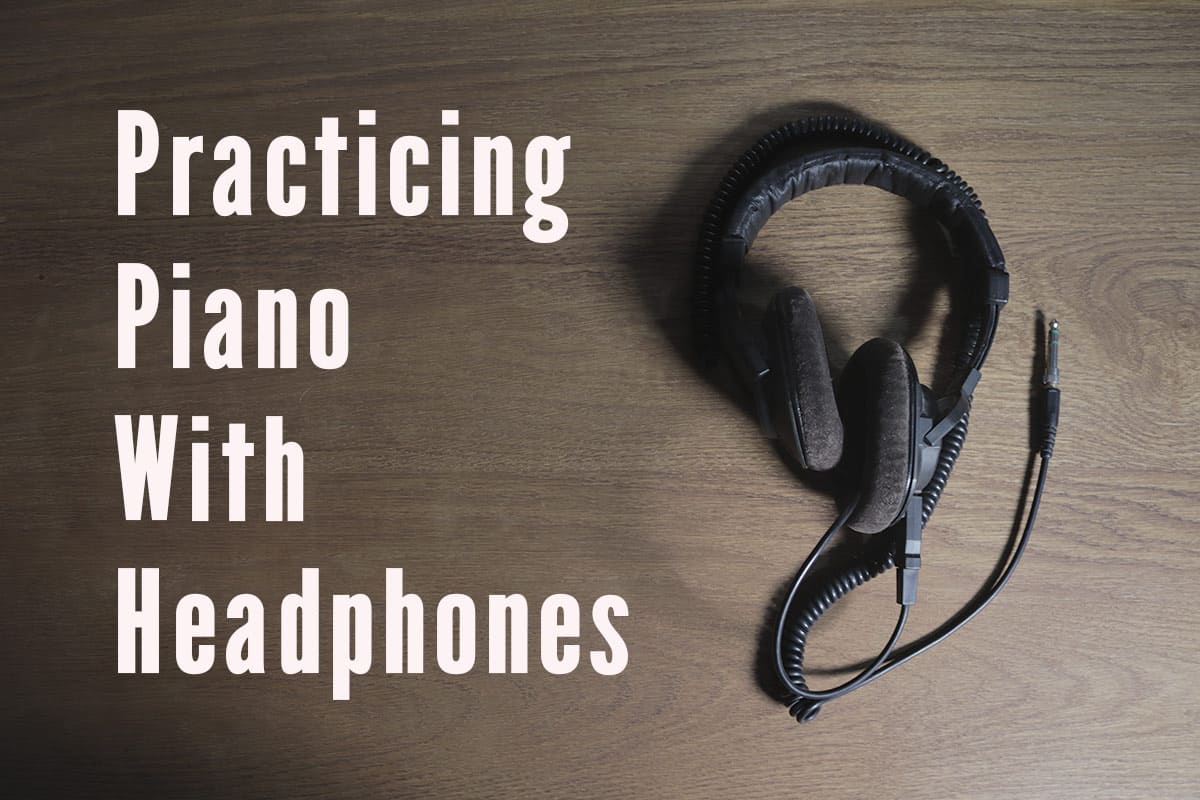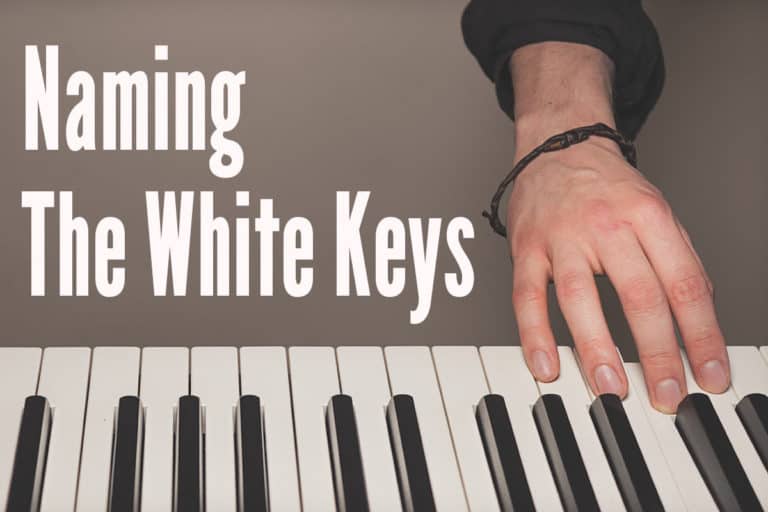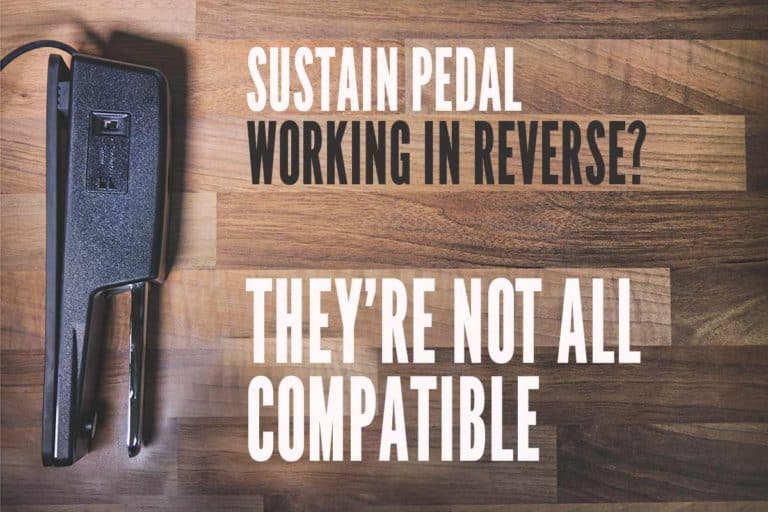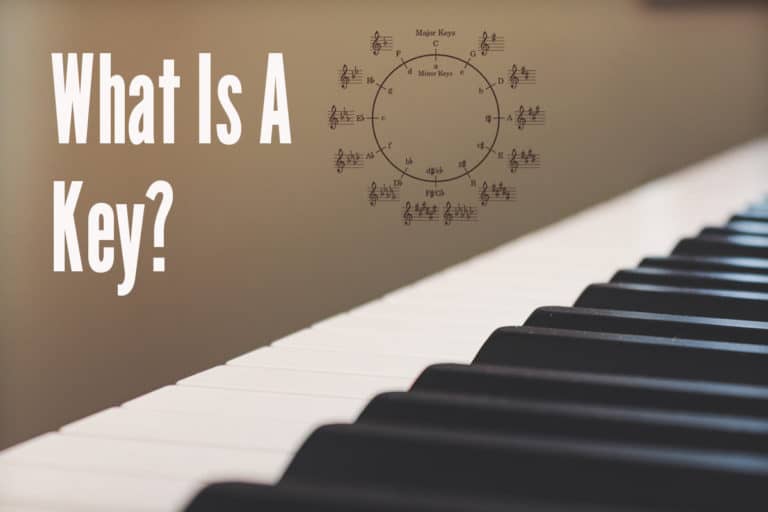Practicing Piano With Headphones: Benefits – Choosing A Pair – Tips
This post contains affiliate links.
Although by no means the loudest of instruments, learning piano can still be a noisy affair whether you’re using real or digital piano. Many players choose to spend some of their practice time using headphones.
Restrictions on your schedule can hinder progress so the main advantage of practicing piano with headphones is that you can do so at any time without disturbing others. They can help you focus too and feel safe to try new things. Professional musicians also use them so it is wise to get accustomed.
There’s quite a few advantages to using headphones for some of your practice time, ways they are really helpful to a musician and a few things you should know about choosing and using them before you start.
The Advantages Of Using Headphones For Practice
Sometimes we like to play LOUD, but often, that’s just impossible. Neighbours, family or housemates may not be quite so keen to hear you practice that same forte section for the 50th time in a row at 10pm. Listening to someone PLAYING the piano and listening to someone PRACTICING are two vastly different things!
At least we’re not drummers though… Luckily, there’s an easy solution and that is to use a digital piano or keyboard and a decent pair of headphones.
You Can Practice Properly, Any Time And For Longer
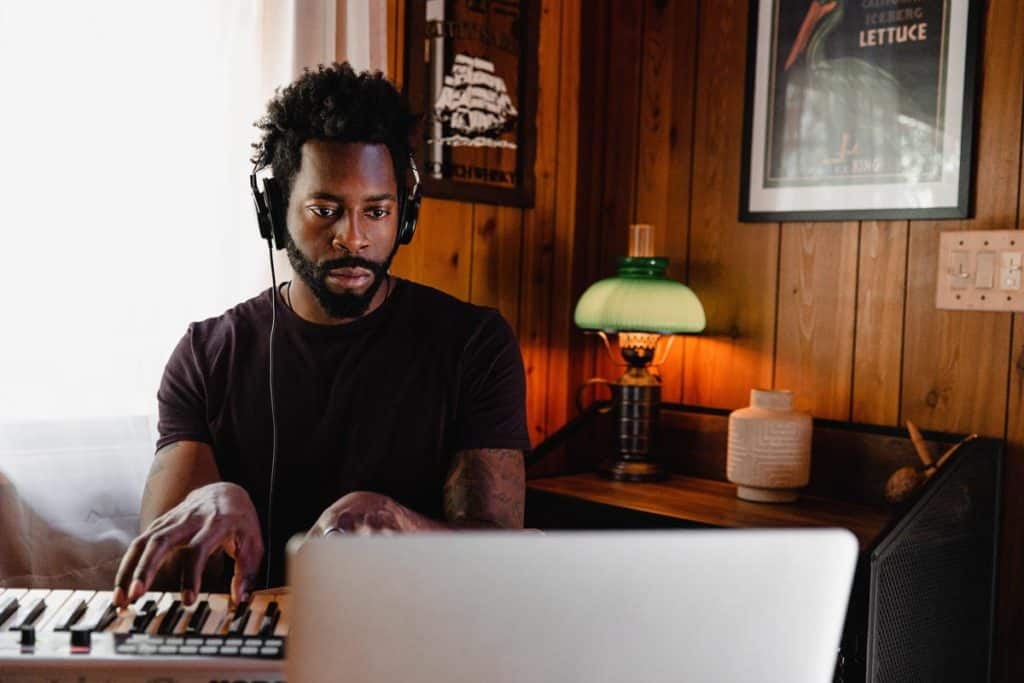
It may be that you want to practice later at night, or for an extended period of time in the day. You may have really thin walls or perhaps those you live with are working from home. There’s all kinds of reasons we can’t constantly make beautiful music in our own living space.
Lives are busy and sometimes it’s difficult enough as it is to find a decent amount of time to practice. With restrictions, you simply won’t get as much (or as frequent) practice and you’ll make less progress. You’ll get frustrated and discouraged too with never being able to just play when the moment takes you. Headphones completely solve this problem, you’ll improve quicker and at the same time, avoid any unneeded stress with those around you.
You may also need to practice a particularly loud section and at the same time, hear how that would sound. If you’re trying to keep the noise down, you will end up practicing the wrong way and engraining the wrong technique. It’s much better to stick on a pair of headphones (careful with excessive volumes though) and be able go through the same physical motions as you otherwise would.
When No One Can Hear You, You Don’t Hold Back
With a pair of headphones on, you can play without fear, explore new territory and push yourself further. The worst thing that can happen is you hit a bum note…and no one will hear it!
It’s often the case, especially with beginners but also experienced players working on something new too, that we’re far more reserved when we’re aware of others can hear us. This is out of fear and the embarrassment of making a mistake or sounding bad. It can actually prevent you from making progress if you’re not fully ‘going for it’ and you can certainly hear caution in a performance. This may be a new piece you’re learning or even new techniques and exercises you’re working on.
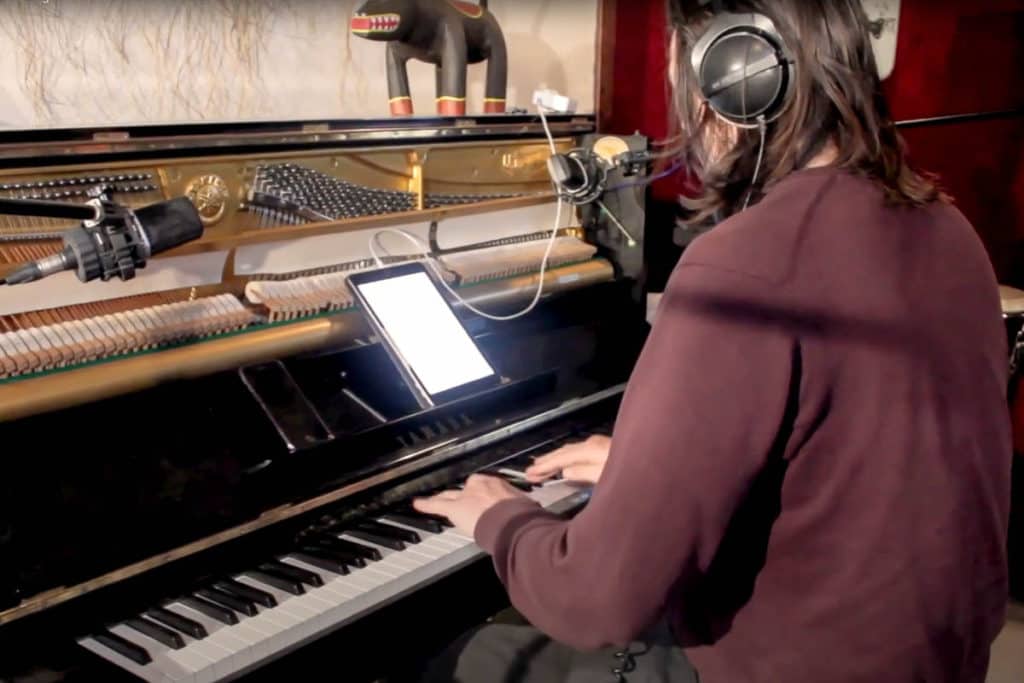
It’s also a MASSIVE ISSUE if you’re doing any sort of improvisation. Then the music is coming not just through you, but directly from you. Now you REALLY want it to sound good. If you’re bothered about people hearing you, you may play very cautiously and safely, being deterred from attempting anything new and hindering any possible growth. How are you going to discover new things without exploring?
Making mistakes is an important part of the learning process so you need to feel safe trying things out properly without worrying about annoying anyone else or any possible judgement.
Blocking Out Distraction And Hearing Yourself Better
As well as stopping others from hearing you, there’s the happy side effect that you can hear less of others or any other distractions from the outside world. With a quality pair of the right kind of headphones, this is maximised (More on that below). Better focus on the task at hand will undoubtably result an a more productive practice session.
Listening through headphones can often allow you to really zone your ears in on the music, hear every note individually with more clarity and focus on the nuance of your playing. Not always, of course, but depending on what keyboard or piano you’re working with and the sound of the room you’re in, it can sometimes be difficult to hear some of the subtleties and things may go unnoticed. Headphones can therefore help you perfect a particular section or iron out any issues.
You NEED To Use Headphones Sometimes So Get Used To Them
I’m sure you will have seen footage of a recording session, live radio session and even stage performances too sometimes where the musicians are all wearing headphones. It’s a necessity as a professional musician be accustomed to them but also really handy for the hobbyist.
They’re needed to isolate sound sounds, so players can hear what they’re playing along to without that noise getting picked up by the mic and so musicians can hear themselves adequately in the mix on stage. Even if you have no ambition to be a professional or semi professional, you still may find yourself recording or performing.
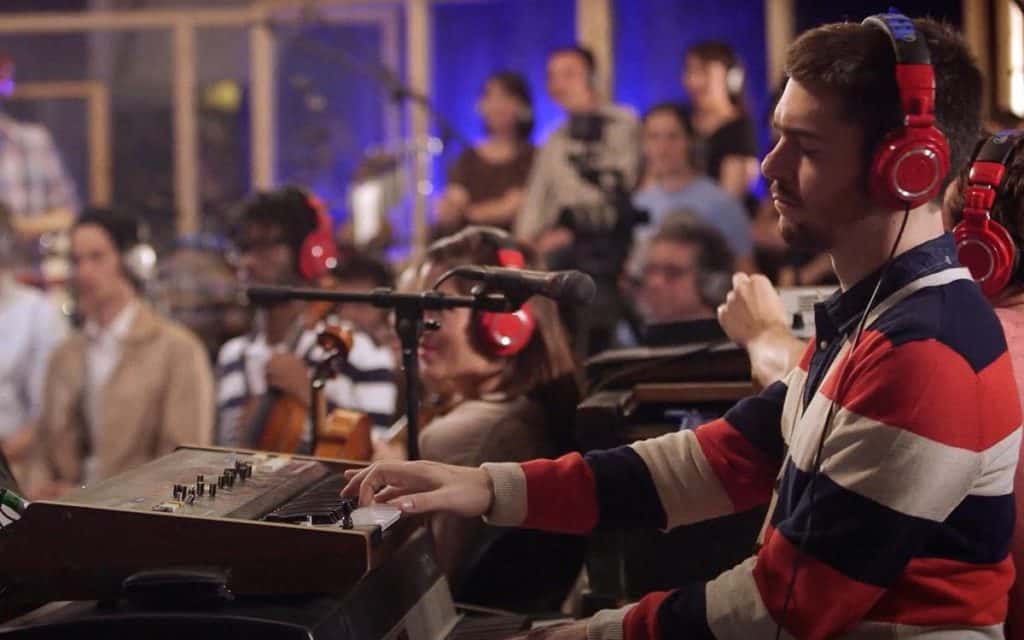
Hearing yourself in headphones, hearing other things in headphones and playing along can actually be quite strange sounding if you’re not used to it. It’s a bit tricky to explain but essentially, if you’re only used to playing and hearing things in a certain way in a certain room for example, it can easily throw you when the environment is changed. Practicing with headphones will just help you become a better prepared musician.
Listening To Music With Headphones
Even as you’re just casually listening to music, headphones will help you notice more of what’s going on in music. Listening more actively with ‘musician’s ears’ is an important part of your learning experience .
It’s particularly important to be listening to performances of whatever you’re learning, whatever kind of style the music is. Listening to and analyzing what professionals have done will help you improve drastically. Don’t just do this with headphones, but certainly try it sometimes and see what you notice.
I spend a lot of time working things out by ear from recordings. Headphones are incredibly helpful with this as sometimes I notice details with headphones on that I can’t even hear through good quality speakers! Again, don’t just use headphones for this but they’re a useful tool at your disposal.
Can You Play A Real Piano With Headphones?
Some folks will be lucky enough to own a real, acoustic piano, an upright or a grand. Unless you have a special kind though, you will only be playing out loud.
Most real pianos have no electronic parts and cannot be played with headphones. ’Silent’ or ‘Hybrid’ pianos use technology allowing you to play through headphones whilst still retaining the same acoustic experience. These are very expensive so many pianists use a high quality digital piano instead.
I would personally love to own a silent piano, they seem like the perfect solution! They are quite the investment though and for many musicians, it makes sense to spend the money on a digital piano which also offers you portability.
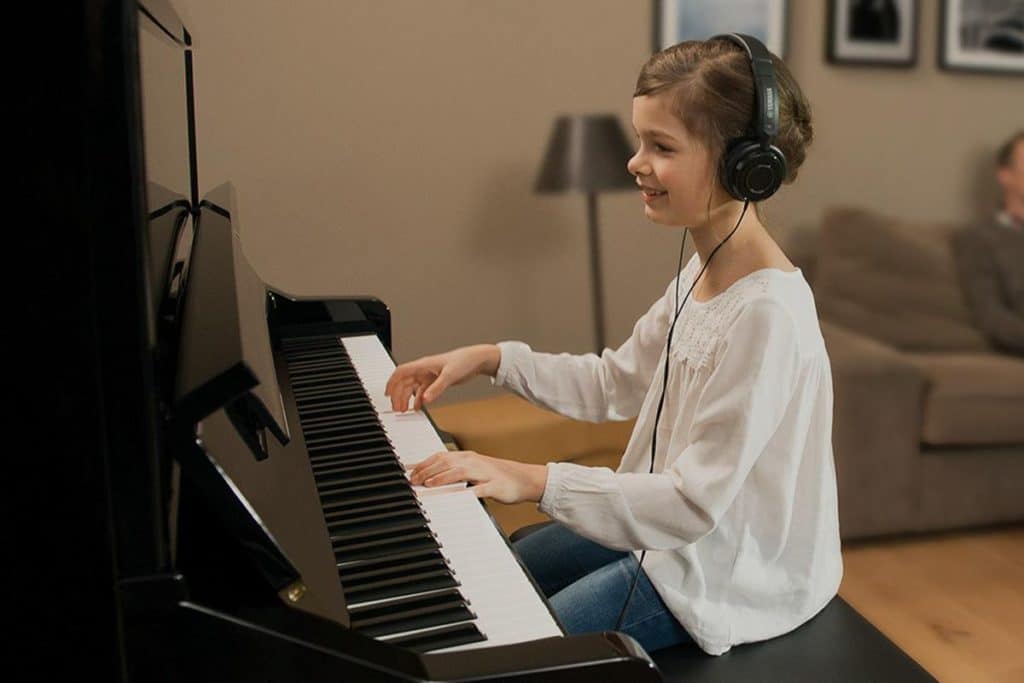
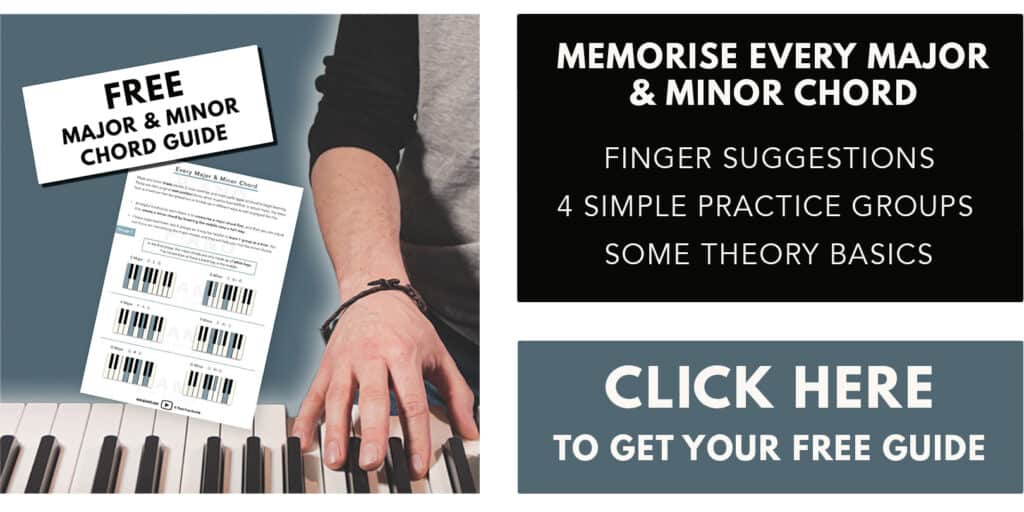
Choosing A Pair Of Headphones
Over Ear VS In Ear
Without getting too into the weeds of the many different types of headphones on the market, I just want to make a distinction between ‘over the ear’ headphones that completely enclose your ears and ear buds, like those that just fit in your ear cavity. Closed Back over the ear headphones are best for noise isolation.
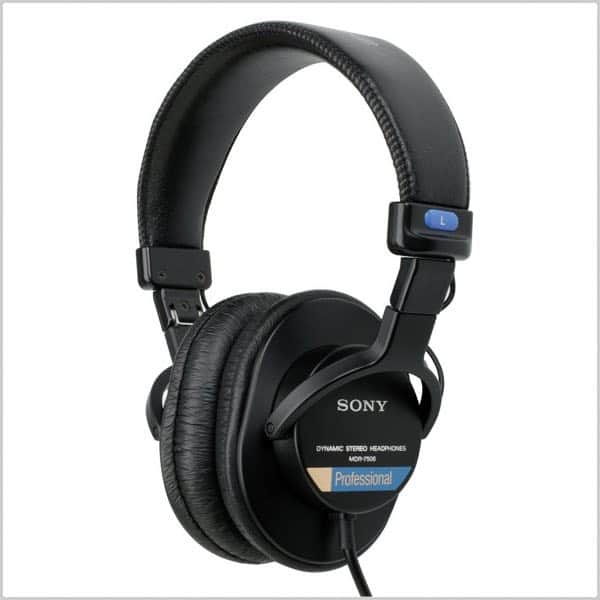
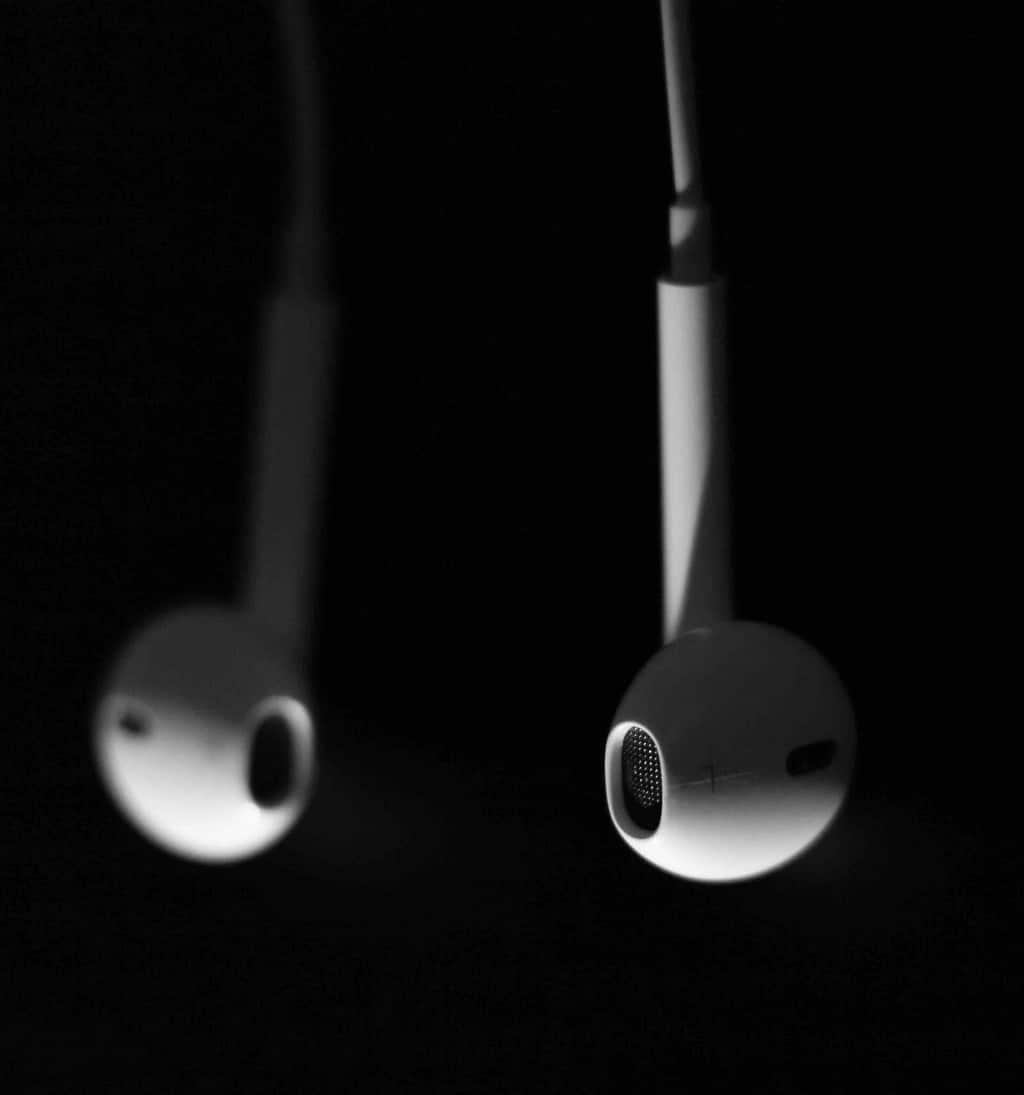
I highly recommend using proper over the ear headphones. They fit and sound much better, are much more comfortable over longer periods of time, less likely to fall off, tend to come with a longer cable and importantly, they isolate sound and let your hear much better with a greater level of clarity (Unless they’re very low quality of course).
The Chord
Make sure you buy a pair of headphones with a decent length chord. Trust me, you will thank me when you’re not pulling them off your head every time you move slightly too far to the left.
My headphone cable is 1.5 metres long BUT it’s a coiled chord so it stretches further. It’s closer to 3 metres before I start to feel any tension. This may sound like overkill but it’s really handy to have flexibility of movement.
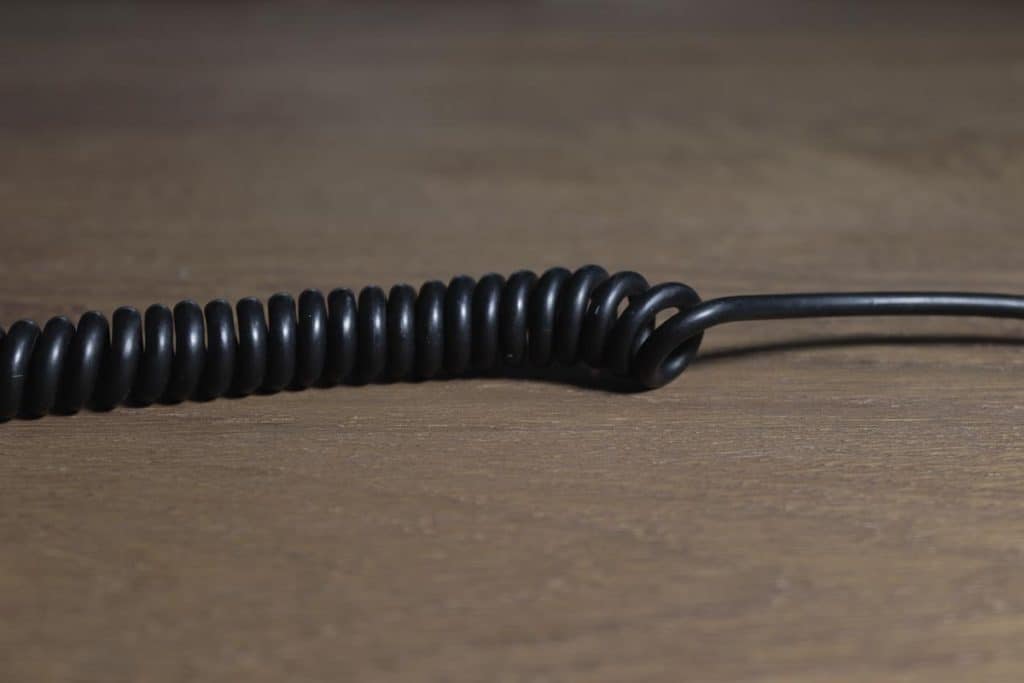
If possible, a coiled chord like this is a much better, neater option. It allows you to have a lot more stretch without excess chord laying around to trip over. The best thing is that the stretchiness of them means you don’t just accidentally walk off with your headphones still on and jerk when you reach the end of the cable. This can easily damage equipment like your jack input or the headphones themselves.
Comfort
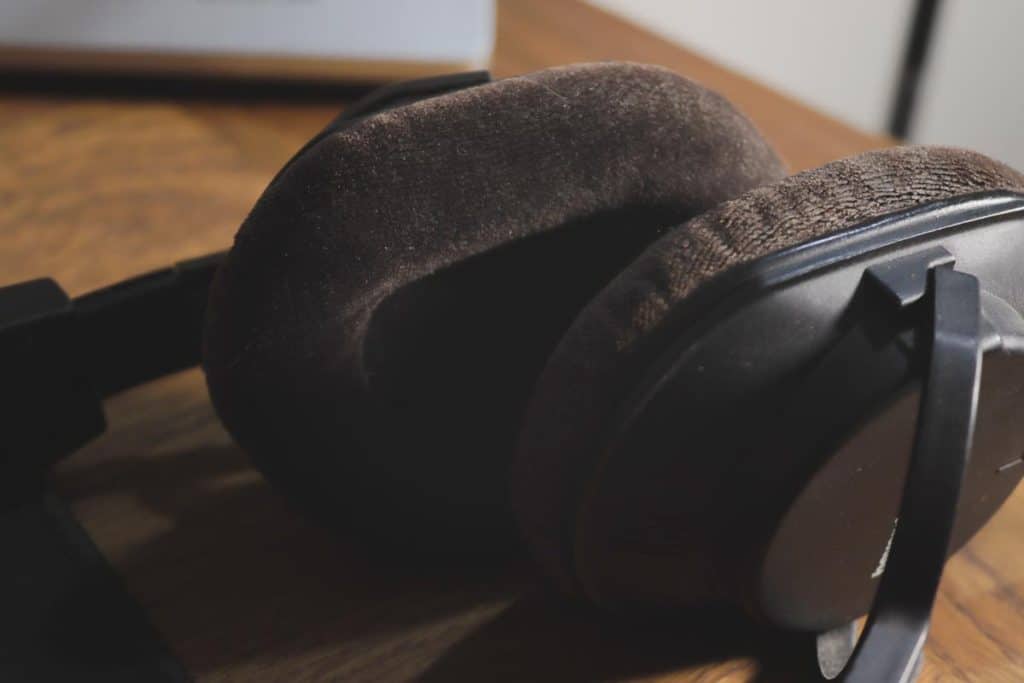
You will likely be sitting at the piano for extended periods of time so comfort is pretty important. You want a pair of over the ear style headphones which have a decent amount of padding and are not too tight.
Quality
Buying a decent pair of headphones is a good idea for 2 main reasons. Firstly the sound quality is very important to make the most out of your practice time so you can hear yourself playing with clarity. It’s much easier to enjoy what you’re doing, be more productive and make better music when what you’re hearing actually sounds good. Seriously, it makes a huge difference!
Secondly, a cheap pair is a false economy. In general, they won’t last as long. I’ve had a pair of headphones (See Below) for over 10 years and they’re still going strong! You don’t need to spend megabucks or pay for a name like ‘beats’ but it’s worth the investment in quality when you will spend so much time using them.
The Best Headphones For Playing Piano – My Picks
There are so many headphones on the market to choose from so here’s a few solid options to narrow it down.
Best Budget Options
These offer decent sound quality and comfort from well know audio brands at a more affordable price point. They look great too but do not feature the coiled cable.
AKG Pro Audio K72 Closed-Back Studio Headphones
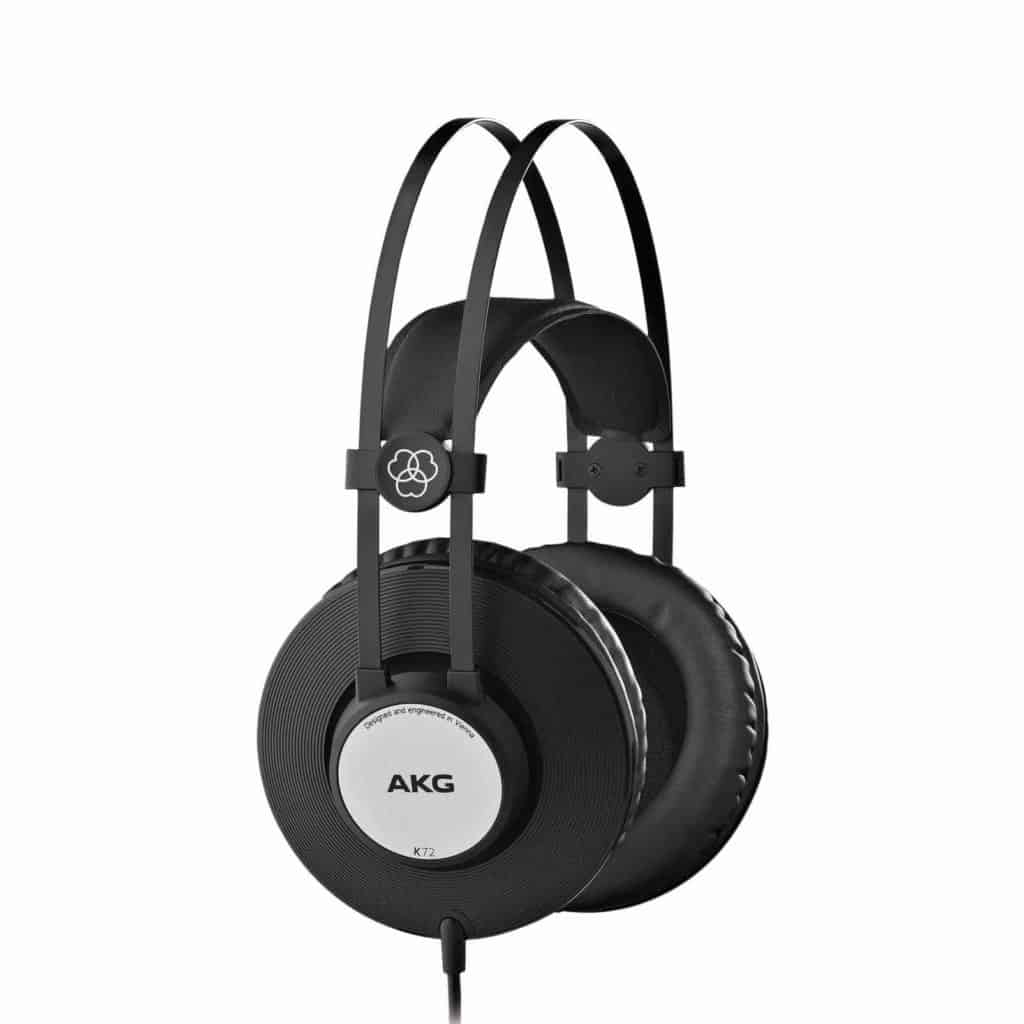
You can check prices for these headphones on Amazon HERE
Audio-Technica ATH-M20x Professional Studio Monitor Headphones
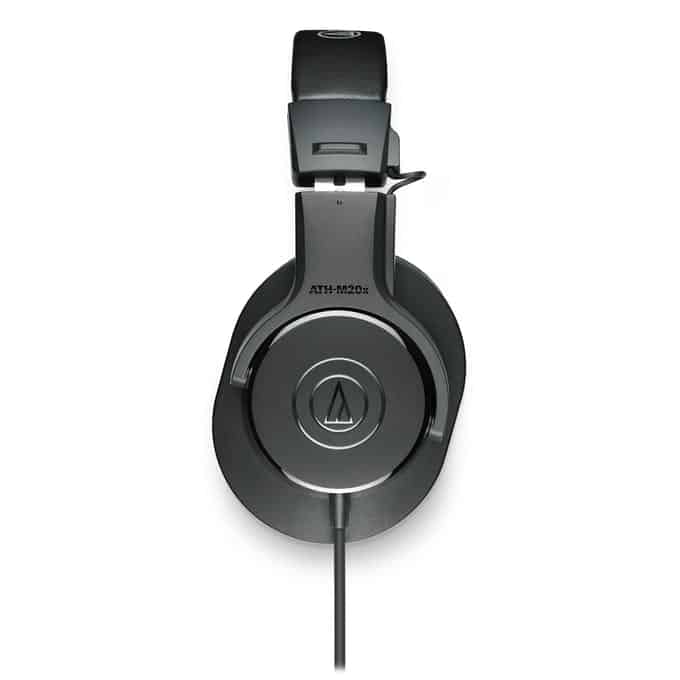
You can check prices for these headphones on Amazon HERE
Best under $100
These are excellent quality, professional and comfortable headphones that come with coiled cables. (The Audio-Technica ATH M40x includes both types)
Audio-Technica ATH-M40x Professional Studio Monitor Headphones
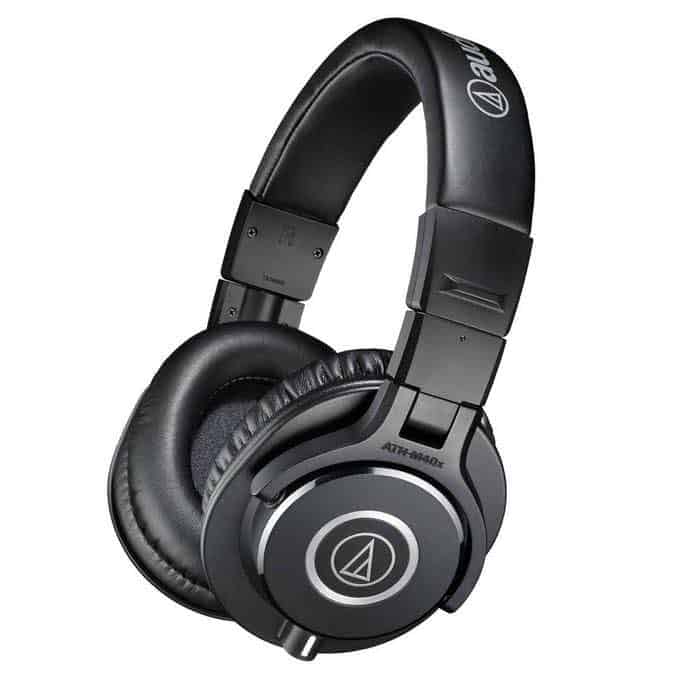
You can check prices for these headphones on Amazon HERE
Sony MDR7506 Professional Large Diaphragm Headphones

You can check prices for these headphones on Amazon HERE
Pro Option (My Headphones)
I love these headphones, they are superb professional studio quality monitoring headphones. I was recommended these by a professional ADR recordist over 10 years ago and they’ve lasted ever since!
Beyerdynamic DT-250 Closed Dynamic Headphones
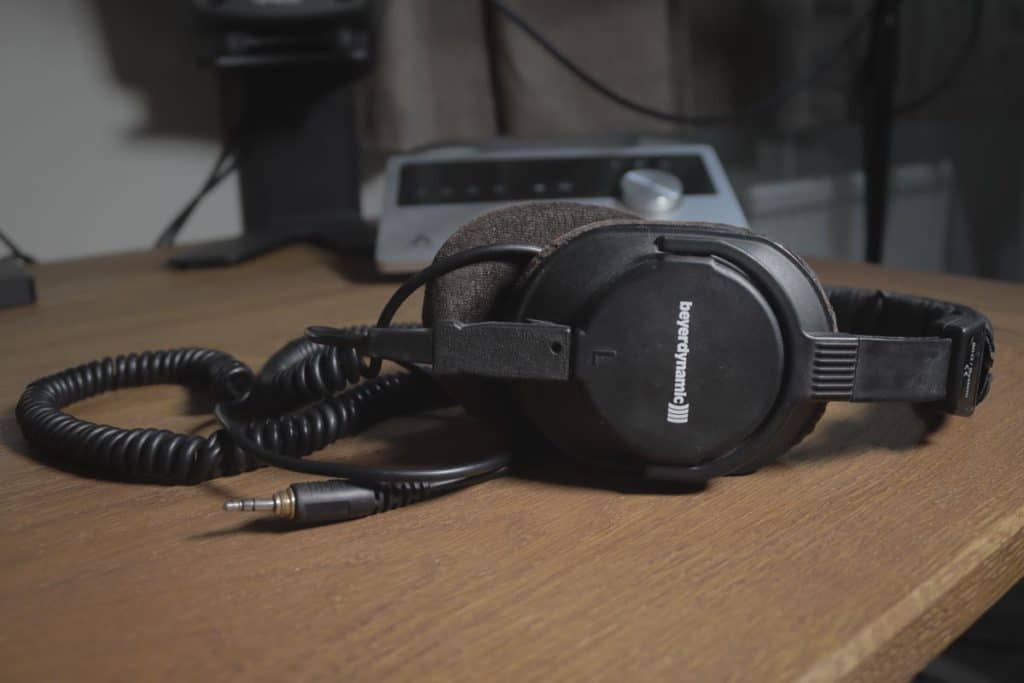
You can check prices for these headphones on Amazon HERE
You May Need A Jack Adapter Too
Many headphones use an 1/8″ jack connection whilst a lot of keyboards use a 1/4″ jack input. Basically the headphone connection is too small for the input so you may need to buy a stereo jack adapter like the one pictured below. Check if your headphones come with one first though.
They’re pretty cheap to pick up but very easy to lose so you may want to order a couple! Simply plug your phones into the adapter and then straight into the keyboard. You can pick one up from Amazon HERE.
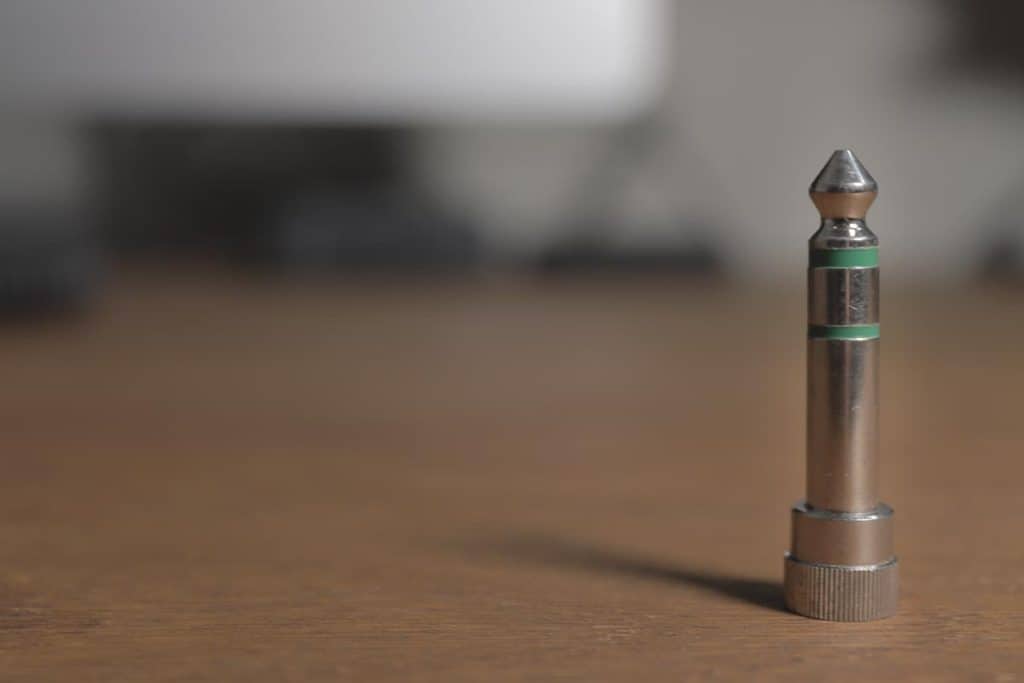
Tips Using Your Headphones At The Piano
Setting Up
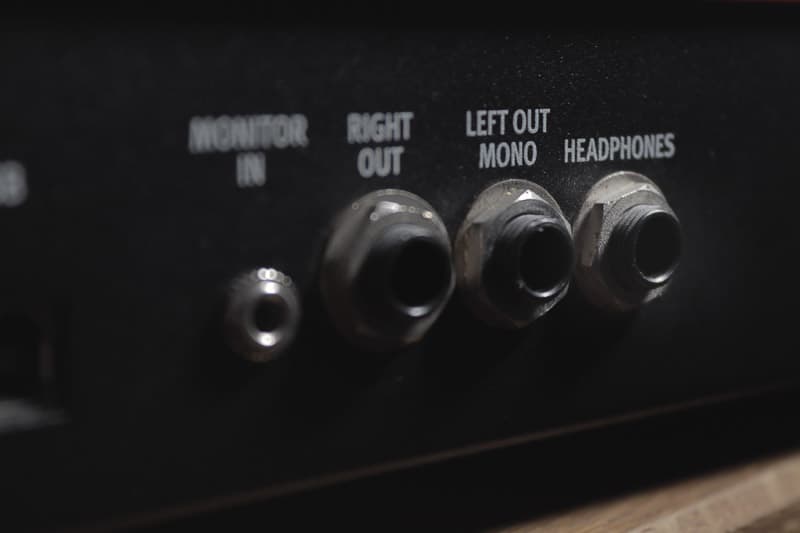
Check the headphone socket on your keyboard and check what size it is. They’re often labelled ‘phones’ and either somewhere at the back or on the front face at one of the far ends. Most are 1/4″ which is roughly the diameter of a pen. Some are smaller at 1/8″ which is about the size of a pen’s nib.
Your headphones are likely to be 1/8″ so plug them into your jack adapter first and then straight into the keyboard input (If your keyboard already has the 1/8″ input, there’s no need for the adapter). With keyboards that have in built speakers, make sure that when you want to hear the piano aloud again, you pull out the phones AND adapter because otherwise it will bypass the sound straight to the headphones output.
Cable Management
You really just need to get yourself set up so that your cable isn’t restricting any movement and preventing you from practising properly. It will depend on whether you have a coiled chord or not and the position of your headphone socket but try to not have the chord dangling in front of you. If possible, have the cable coming around the back of you with enough space that you can comfortably move your arms either side.
An EXTRA TIP with a normal style cable is to hook it around the keyboard stand so that if you do accidentally walk off with your headphones on, it pulls on that instead of yanking and potentially damaging the keyboard input.
One Ear off
I sometimes play with one ear off at a time and there’s a few reasons this can be handy. To give your ears a break from the noise you can switch sides or sometimes ears may get hot and uncomfortable when you’ve been playing a while. You may also want to listen and play along to something else to something, figure it out by ear or just emulate a performance. Sometimes though, you just need to keep an ear our for the doorbell!
Be Cautious Of Volume And Time
As musicians, our ears are our greatest asset and we need to look after them! Make sure that you are not using excessive volume levels for extended periods of time. If it feels a bit too loud, just dial it back and make sure to take a break every so often. You can also use the one ear off method to rest one ear at a time. Audio can really start to sound bad any when it’s too loud anyway and you won’t hear what you’re playing as it’s really meant to be.
I think a common sense approach is best suited here as it won’t be exactly the same for everyone and depends what you’re playing. For more detailed info on headphone safety you can read this article from deafblind.org.uk.
Don’t Always Practice With Headphones
Make sure that you do also get a decent amount of time practicing aloud. You still need to be acclimatised to the sound of a more ‘real’ situation, like a performance. It’s good to start getting used to people hearing you play and the sound and dynamics of your instrument in a real space. Things can sound very different when played loud in a room or amplified even compared with headphones which may affect how or what you choose to play.

